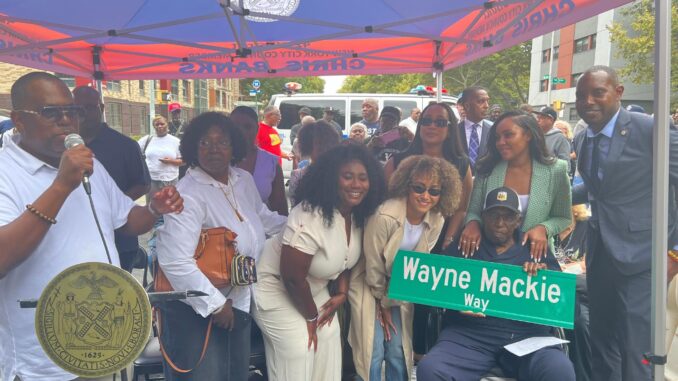
BY KIM GILL
Family, friends, neighbors, and community leaders gathered at the Linden Houses in East New York, Brooklyn to pay homage to a local hero. The corner of Van Siclen and Wortman Ave was transformed into “Wayne Mackie Way” in honor of the legendary NFL official. “No words can describe what I’m feeling right now. I am emotional and inspired by everyone who came out. He is so loved,” states Jade Mackie, Mr. Mackie’s daughter.
Councilman Chris Banks (D-NY) partnered with the President of the Linden Houses Association, Carol Barnes, and the Mackie family to pass the legislation on the street co-naming for Mackie. Banks presented the plaque to the family and, with the help of Mackie’s father, unveiled the street sign on Saturday, September 7th. “This is a great day in the 42nd council district. It’s a great way to honor, immortalize, and commemorate this great leader of East New York,” stated Banks. While the event focused on legacy, residents and local leaders wanted to emphasize community with street co-namings.
Many in attendance felt that street co-namings should be named after people who lived, worked, and gave back to the community instead of individuals with no relationship to it. According to Senator Roxanne Persaud (D-NY), “Street namings should always have a significance and connection to the community. Too often, you’ll see a street naming and wonder what this person has done or contributed to the community. With this renaming, we see the growth of the person and what they gave back to the community, and this is why it’s so significant.”
Wayne Mackie grew up on 190 Wortman Street in the Linden Houses in East New York. He attended Brooklyn Tech High School, where he played football until he got injured and pivoted his interest in football towards officiating. He graduated from Colgate University in 1982, receiving a Bachelor’s in Economics. In 1992, he began his career as a referee, officiating the PSAL junior varsity games, and in 1996, he eventually moved up to officiating Division II and Division III collegiate games.
That following year, he began working full-time for the New York City Housing Association (NYCHA) as the Director of Operations for the Division of Neighborhood Preservation, officiating only on weekends. In 2007, he joined the NFL, becoming a Head Linesman. He got his big break in 2016 when he was one of nine officials chosen out of 121 to referee Super Bowl 50 between the Denver Broncos and the Carolina Panthers. That following year, he became the league’s Vice President of Officiating Evaluation and Development.
Despite his success, Mackie always gave back to his community. In 2010, he co-sponsored the NFL/NYCHA Football Officiating Academy. This eight-week program allowed 40-50 NYCHA residents to learn what it takes to be an NFL official. Curtis Williams, the Manager of NYCHA’s Department of Resident Engagement, states and manager of the program, said, “It was an opportunity and a career path for our youth that they didn’t think was attainable.” Manny Moreno, a program graduate, entered as a participant in his first year and started a non-profit, Allegiance Youth Football, in 2011, became an assistant in his second year, and became a consultant in his third year with the program. He eventually became a supplemental college official for two seasons and now sits on the executive board of his non-profit. Moreno remembered that “he taught me that you have to put in the work years and take officiating seriously.”
Unfortunately, the NFL/NYCHA program was short-lived and eventually ended due to a lack of funding in 2016. But in 2022, the NFL renamed its officiating program the Mackie Development Program, which scouts officials from high school and collegiate football for an opportunity to work in the NFL. Mackie revamped the program using his decade’s worth of experience, providing resources for technology and making the program more diverse. According to Walt Anderson, former NFL Vice President of Officiating, “Wayne was such a great contributor to the program that it was only fitting to name it after him. We get applications in the thousands, but only five officials get accepted to work in the NFL each year; it’s a very select group.”
